Plot
The story is set in the Qing dynasty during the reign of the Yongzheng Emperor. Yongzheng's harsh and brutal policies lead to widespread discontent and dissension. Meanwhile, a secret death squad, named after their dreaded weapon — the flying guillotine — goes around slaying the emperor's enemies.
The young crown prince, Hongli, disguises himself as a commoner and embarks on an inspection tour to Jiangnan. There, the prince evades assassination attempts orchestrated by nobles plotting to seize the throne, and uncovers a shocking truth about his birth and origin. Besides, he also meets and befriends two maidens, Lü Siniang and Yuniang, who turn out to be actually planning to assassinate Yongzheng. Lu Siniang is the granddaughter of Lu Liuliang, whose family was executed. She trained under Princess Changping, the last princess of the former dynasty.

The Qianlong Emperor, also known by his temple name Emperor Gaozong of Qing, born Aisin-Gioro Hongli, was the fifth emperor of the Qing dynasty and the fourth Qing emperor to rule over China proper. The fourth son of the Yongzheng Emperor, he reigned officially from 11 October 1735 to 8 February 1796. In 1796, he abdicated in favour of his son, the Jiaqing Emperor, out of filial piety towards his grandfather, the Kangxi Emperor, who ruled for 61 years, so that he not officially usurp him as the longest-reigning emperor. Despite his retirement, however, the Qianlong Emperor retained ultimate power as the Emperor Emeritus until his death in 1799, making him one of the longest-reigning monarchs in history, and dying at the age of 87, one of the longest-lived.

The Yongzheng Emperor, also known by his temple name Emperor Shizong of Qing, born Aisin-Gioro Yinzhen, was the fourth emperor of the Qing dynasty, and the third Qing emperor to rule over China proper. He reigned from 1722 to 1735. A hard-working ruler, the Yongzheng Emperor's main goal was to create an effective government at minimal expense. Like his father, the Kangxi Emperor, the Yongzheng Emperor used military force to preserve the dynasty's position.
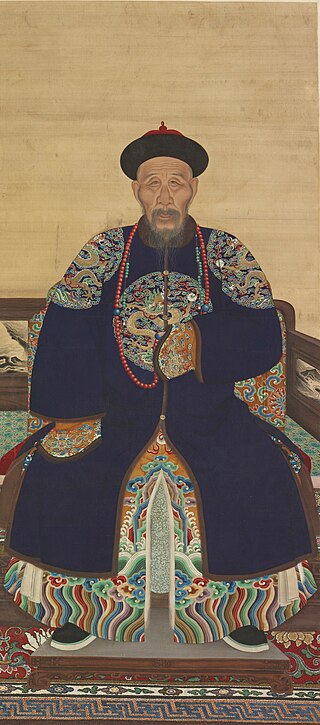
Yunti, born Yinzhen and also known as Yinti before 1722, formally known as Prince Xun, was a Manchu prince and military general of the Qing dynasty.
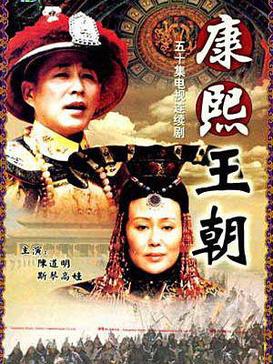
Kangxi Dynasty is a 2001 Chinese television series based on the novel Kangxi Da Di by Eryue He. The series is a prequel to the 1997 television series Yongzheng Dynasty, and was followed by Qianlong Dynasty in 2002.
Hongshi was a Manchu prince of the Qing dynasty. Born to the ruling Aisin Gioro clan as the third son of the Yongzheng Emperor, he was banished from the imperial clan in 1725, ostensibly for supporting his uncle Yunsi, a political rival of his father. He died in disgrace in 1727 but was later posthumously restored to the imperial clan by his younger brother, the Qianlong Emperor.
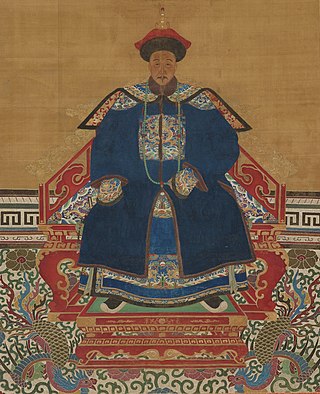
Yinzhi, also known as Yunzhi, was a Manchu prince of the Qing Dynasty.
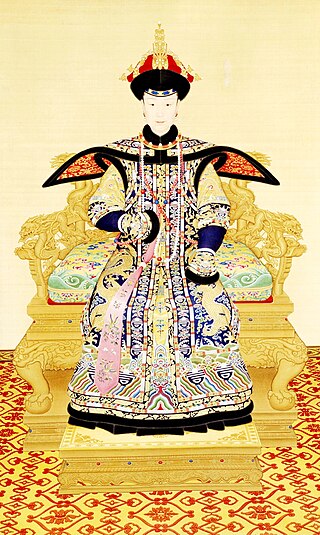
Empress Xiaoxianchun, of the Manchu Bordered Yellow Banner Fuca clan, was the first wife of the Qianlong Emperor. She was empress consort of Qing from 1738 until her death in 1748. Described as a virtuous person and favoured by the Emperor, she did not like spending money for her own good and took her duties seriously when it came to Confucian rituals.
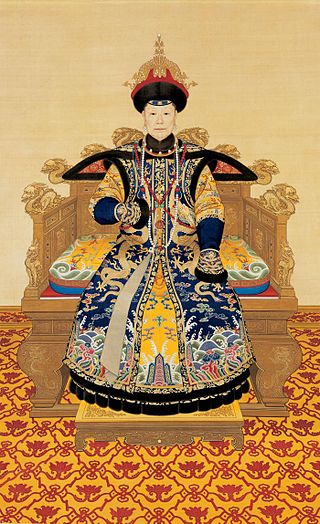
Empress Xiaoshengxian, of the Manchu Bordered Yellow Banner Niohuru clan, was a posthumous name bestowed to the consort of Yinzhen, the Yongzheng Emperor and mother of Hongli, the Qianlong Emperor. She was honoured as Empress Dowager Chongqing during the reign of her son and posthumously honoured as empress, although she never held the rank of empress consort during her lifetime.
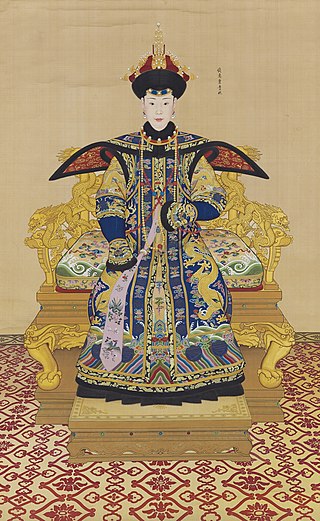
Imperial Noble Consort Chunhui, of the Han Chinese Plain White Banner Su clan, was a consort of the Qianlong Emperor. She was two years his junior.

Imperial Noble Consort Huixian, of the Manchu Bordered Yellow Banner Gaogiya clan, was a consort of the Qianlong Emperor.

Yunli, born Yinli, formally known as Prince Guo, was a Manchu prince of the Qing dynasty.

Huang Taizi Mishi is a 2004 Chinese television series produced by You Xiaogang. The series is the second instalment in a series of four television series about the history of the early Qing dynasty. It was preceded by Xiaozhuang Mishi (2003), and followed by Taizu Mishi (2005) and Secret History of Kangxi (2006), all of which were also produced by You Xiaogang.
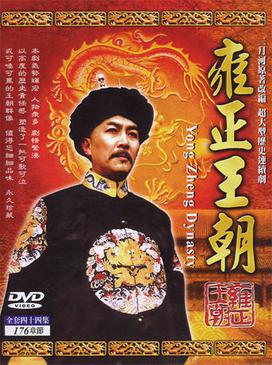
Yongzheng Dynasty is a 1999 Chinese historical television series starring Tang Guoqiang and Jiao Huang. The series, spanning 44 episodes, occupied the CCTV-1 prime time slot; after its premiere, there have been many re-runs of the show on television networks in mainland China, Taiwan and Hong Kong. The series was adapted from Eryue He's historical novels, which are loosely based on historical events in the reigns of the Kangxi and Yongzheng Emperors in the Qing dynasty (1644–1911). The series was followed by a 2001 prequel, Kangxi Dynasty, and a 2002 sequel, Qianlong Dynasty, both of which were also based on Eryue He's novels.

Palace II is a 2012 Chinese television series written and produced by Yu Zheng and directed by Lee Wai-chu. It is a sequel to the 2011 television series Palace. The series was first broadcast on HBS in China from 20 January to 8 February 2012. It was followed by Palace 3: The Lost Daughter (宫锁连城), and the film The Palace , otherwise known as The Palace: Lock Sinensis (宫锁沉香).

Empresses in the Palace is a 2011 Chinese television series based on the novel of the same name by Liu Lianzi. Directed by Zheng Xiaolong, it stars Sun Li in the title role of Zhen Huan. The series started airing in China for the first time on 17 November 2011.

Hero of the Times is a Singaporean-Taiwanese wuxia television series based on legends about Fong Sai-yuk, a Chinese folk hero and martial artist who lived during the Qing dynasty. It was co-produced by the Television Corporation of Singapore and Taiwan's China Television, directed by Hu Mingkai, and starred Chinese actor Vincent Zhao as Fang Shiyu. It was first aired in Singapore on TCS Eighth Frequency from late 1999 to early 2000.
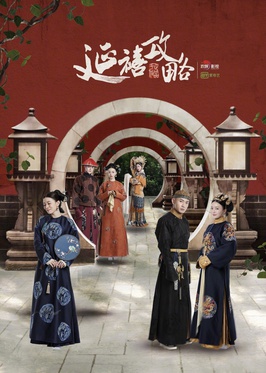
Story of Yanxi Palace is a Chinese historical series recounting the struggles of a palace maid in the court of the Qianlong Emperor. It was created by Yu Zheng, with original screenplay written by Zhou Mo, and later developed into a novel by Xiao Lian Mao. Starring Wu Jinyan, Charmaine Sheh, Qin Lan, Nie Yuan, Tan Zhuo and Xu Kai, the series premiered on iQiyi from July 19, 2018 to August 26, 2018. During its run it was streamed more than 15 billion times.

Imperial Noble Consort Shujia, of the Korean Gingiya clan which was placed into the Manchu Plain Yellow Banner after her death, was a consort of the Qianlong Emperor. She was two years his junior. Imperial Noble Consort Shujia was also the Qing Dynasty's only imperial concubine of ethnic Korean heritage.

Aisin Gioro Yuntao was a Qing dynasty imperial prince and the 12th son of the Kangxi Emperor. Yuntao was rather a crony of the Yongzheng Emperor and his adoptive brother, which helped him persist in the succession war. He became the first bearer of the Prince Lü of the First Rank title.
A coup of Hongxi was an unsuccessful coup d'etat organised by Hongxi, Prince Li of the First Rank and the eldest surviving son of deposed crown prince Yunreng and other co-conspirators, most of whom were sons of the imperial princes who did not participate in the succession brawl between Yinzhen, Yunzhi, Yunsi and their supporters.

















